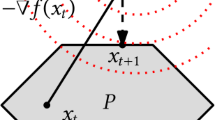Abstract
For univariate functions, we compute optimal breakpoint systems subject to the condition that the piecewise linear approximator, under-, and over-estimator never deviate more than a given \(\delta \)-tolerance from the original function over a given finite interval. The linear approximators, under-, and over-estimators involve shift variables at the breakpoints allowing for the computation of an optimal piecewise linear, continuous approximator, under-, and over-estimator. We develop three non-convex optimization models: two yield the minimal number of breakpoints, and another in which, for a fixed number of breakpoints, the breakpoints are placed such that the maximal deviation is minimized. Alternatively, we use two heuristics which compute the breakpoints subsequently, solving small non-convex problems. We present computational results for 10 univariate functions. Our approach computes breakpoint systems with up to one order of magnitude less breakpoints compared to an equidistant approach.





Similar content being viewed by others
References
Kallrath, J.: Combined strategic and operational planning—an MILP success story in chemical industry. OR Spectrum 24(3), 315–341 (2002)
Kallrath, J., Maindl, T.I.: Real Optimization with SAP-APO. Springer (2006)
Zheng, Q.P., Rebennack, S., Iliadis, N.A., Pardalos, P.M.: Optimization models in the natural gas industry. In: Rebennack, S., Pardalos, P.M., Pereira, M.V., Iliadis, N.A. (eds.) Handbook of Power Systems I, chap. 6, pp. 121–148. Springer (2010)
Frank, S., Steponavice, I., Rebennack, S.: Optimal power flow: a bibliographic survey I. Energy Syst. 3(3), 221–258 (2012)
Frank, S., Steponavice, I., Rebennack, S.: Optimal power flow: a bibliographic survey II. Energy Syst. 3(3), 259–289 (2012)
Tomlin, J.A.: Special ordered sets and an application to gas supply operating planning. Math. Progr. 45, 69–84 (1988)
Beale, E.L.M., Tomlin, J.A.: Special facilities in a general mathematical programming system for nonconvex problem using ordered sets of variables. In: Lawrence, J. (ed.) Proceedings of the Fifth International Conference on Operational Research 1969, pp. 447–454. Tavistock Publishing (1970)
Beale, E.L.M.: Two transportation oroblems. In: Proceedings of the Third International Conference on Operational Research 1963, pp. 780–788. Dunod, Paris and English Universities Press (1963)
Beale, E.M.L., Forrest, J.J.H.: Global optimization using special ordered sets. Math. Progr. 10, 52–69 (1976)
de Farias Jr, I.R., Johnson, E.L., Nemhauser, G.L.: A generalized assignment problem with special ordered sets. A polyhedral approach. Math. Progr. 89, 187–203 (2000)
de Farias Jr, I.R., Zhao, M., Zhao, H.: A special ordered set approach for optimizing a discontinuous separable piecewise linear function. Oper. Res. Lett. 36, 234–238 (2008)
Leyffer, S., Sartenaer, A., Wanufelle, E.: Branch-and-refine for mixed-integer nonconvex global optimization (2008)
Vielma, J.P., Ahmed, S., Nemhauser, G.: Mixed-integer models for nonseparable piecewise-linear optimization: unifying framework and extensions. Oper. Res. 53, 303–315 (2009)
Vielma, J.P., Nemhauser, G.: Modeling disjunctive constraints with a logarithmic number of binary variables and constraints. Math. Progr. 128, 49–72 (2011)
Rosen, J.B., Pardalos, P.M.: Global minimization of large-scale constrained concave quadratic problems by separable programming. Math. Progr. 34, 163–174 (1986)
Pardalos, P.M., Rosen, J.B.: Constrained Global Optimization: Algorithms and Applications. Lecture Notes in Computer Science. Springer, Berlin (1987)
Geißler, B., Martin, A., Morsi, A., Schewe, L.: Using piecewise linear functions for solving MINLPs. In: Lee, J., Leyffer, S. (eds.) Mixed Integer Nonlinear Programming. The IMA Volumes in Mathematics and its Applications, vol. 154, pp. 287–314. Springer (2012)
Geißler, B.: Towards globally optimal solutions for MINLPs by discretization techniques with applications in gas network optimization. Dissertation, Universität Erlangen-Nürnberg (2011)
Hettich, R., Kortanek, K.O.: Semi-infinite programming. SIAM Rev. 35, 380–429 (1993)
Lopez, M., Still, G.: Semi-infinite programming. Eur. J. Oper. Res. 180, 491–518 (2007)
Tsoukalas, A., Rustem, B.: A feasible point adaptation of the blankenship and falk algorithm for semi-infinite programming. Optim. Lett. 5(4), 705–716 (2011)
Blankenship, J.W., Falk, J.E.: Infinitely constrained optimization problems. J. Optim. Theory Appl. 19, 268–281 (1976)
Rebennack, S., Kallrath, J.: Continuous piecewise linear delta-approximations for bivariate and multivariate functions. J. Optim. Theory Appl. doi:10.1007/s10957-014-0688-2
Duistermaat, J., Kol, J.: Multidimensional real analysis I: differentiation. Cambridge Studies in Advanced Mathematics (2004)
Horst, R., Pardalos, P.M., Thoai, N.V.: Introduction to global optimization, 2nd edn. Kluwer (2000)
Kallrath, J., Rebennack, S.: Computing area-tight piecewise linear overestimators, underestimators and tubes for univariate functions. In: Butenko, S., Floudas, C., Rassias, T. (eds.) Optimization in Science and Engineering. Springer (2014)
Maranas, C., Floudas, C.A.: Global minimum potential energy conformations of small molecules. J. Glob. Optim. 4, 135–170 (1994)
Acknowledgments
We thank Jan Jagla (GAMS GmbH, Cologne) for discussions on bi-level programs and Dr. Alexander Mitsos (MIT, Boston) for his favorable comments related to the SIP nature of our problem, Timo Lohmann and Greg Steeger (both Colorado School of Mines) for their careful proof-reading.
Author information
Authors and Affiliations
Corresponding author
Rights and permissions
About this article
Cite this article
Rebennack, S., Kallrath, J. Continuous Piecewise Linear Delta-Approximations for Univariate Functions: Computing Minimal Breakpoint Systems. J Optim Theory Appl 167, 617–643 (2015). https://doi.org/10.1007/s10957-014-0687-3
Received:
Accepted:
Published:
Issue Date:
DOI: https://doi.org/10.1007/s10957-014-0687-3



